UHart will commemorate the life and legacy of civil rights leader Dr. Martin Luther King Jr. on Wednesday, February 5, 2025, at 12:45 p.m. in Lincoln Theater. The 2025 theme is “I Am My Ancestors' Wildest Dreams.” The observance will include the presentation of the 2025 MLK Beloved Community Awards.
The annual observance provides an opportunity for our community to pause and reflect on the work and impact of Dr. King, while recommitting to the goal of showing empathy, respect, and understanding toward one another in an effort to make the world a better place.
The annual MLK observance program is free and open to the public.
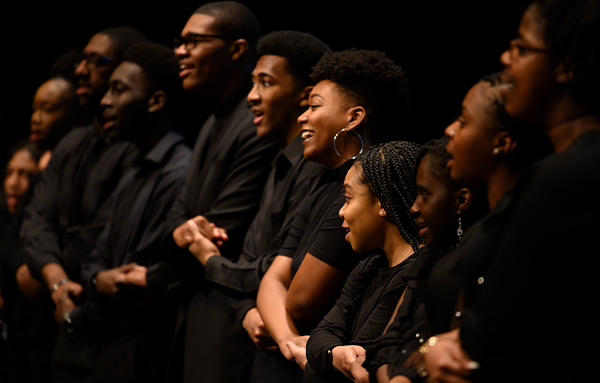
I Am My Ancestors' Wildest Dreams
Prelude
Medley performance
By Derrick M. Roberts II M’23, Psy. D’26
Saxophonist
Welcome
Neville Grey, '’26, M’27, BSBA Business Analytics & Managerial Economics, MBA
Kiara Opoku ’24 'M25, Finance with Business analytics and Managerial Economics, MBA with Marketing
“Lift Every Voice and Sing”
James Weldon Johnson
Performed by Mikala Phillips ‘27, Music Theatre and Talese Brown ‘27, Music Theatre
University of Hartford Magnet School
“Sing About Martin”
performed by Mrs. Moss and Miss Jackie's 2nd grade classes
Remarks
Katherine A. Black
Provost and Vice President of Academic Affairs, University of Hartford
Kristen Harris A ’00, ’02
President, University of Hartford Alumni Board
2025 MLK Beloved Community Awards
Presented by:
Christine Grant, M’99, Assistant Vice President, for Diversity, Equity, and Community Engagement
Llonia Rojan Jackson, ’94, P’26, Director, Cultural Diversity and Belonging
Katherine Black, Provost and Vice President for Academic Affairs
Panel Discussion
Moderator: David Thompson ’89, M ’91, Vice Chair, University of Hartford Board of Regents
Panelists:
Josie Brown
Dean, College of Arts & Sciences and Hillyer College, University of Hartford
Ronnell Higgins
Commissioner, Connecticut Department of Emergency Services and Public Protection
Eboni Nelson
Dean and Professor of Law, University of Connecticut School of Law
Yolande Nicholson Spears
Senior Vice President of Education & Chief Community Impact Officer, Bushnell Center for the Performing Arts
A Charge to the Community!
"Stand Up”
Co-written by Joshuah Brian Campbell and Cynthia Erivo
Preformed by Derrick M. Roberts II M’23, Psy. D’26
Saxophonist
2025 MLK Keynotes Speakers
The theme for this year’s observance is “I Am My Ancestors' Wildest Dreams.” This theme provides us with an opportunity to reflect on the sacrifices and struggles of past generations who fought for equity and freedom. It calls on us to strive for greatness, work toward a just society, while continuing the fight for civil rights championed by Dr. King.
This observance program will feature a panel of distinguished leaders from the Connecticut region, sharing their accomplishments while inspiring pride, purpose, and hope for future generations. The four panelists are Josie Brown, Ronnell Higgins, Yolande Nicholas Spears, and Eboni Nelson.
The program will be moderated by David Thompson ’89, M ’91, U.S. Vice President for Boston Scientific and Vice Chair for the University's Board of Regents.
Josie Brown
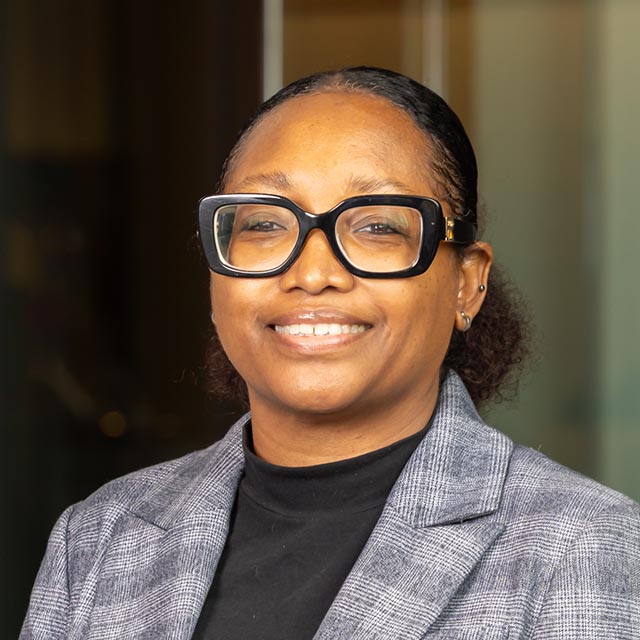
Dean of Hillyer College and the College of Arts and Sciences, University of Hartford
Josie Brown, dean of the College of Arts & Sciences and Hillyer College at the University of Hartford, received her PhD in English Literature & Culture from Stony Brook University; her areas of concentrations are African American Literature, Caribbean Literature, and Post-Colonial Theory & Literature. Dr. Brown identifies as a first-generation student, an immigrant, and a lifelong learner; she is committed to helping college students achieve success both inside and outside the classroom. Dr. Brown strives to live, work, and dream in a world that supports diversity and the cultivation of a pluralistic society.
Ronnell Higgins
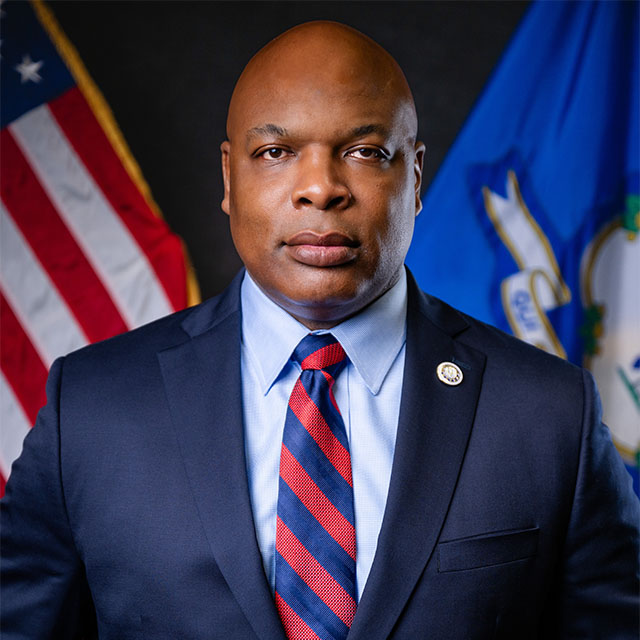
Commissioner, Connecticut Department of Emergency Services and Public Protection
Ronnell Higgins serves as the commissioner of the Connecticut Department of Emergency Services and Public Protection (DESPP). In this role, he leads an agency of public servants dedicated to protecting and improving the quality of life for all by providing a broad range of public safety services, training, regulatory guidance, and scientific services, utilizing enforcement, prevention, education, and state-of-the-art science and technology.
Higgins is actively involved in various government and community groups. He has been recognized for his influence and unwavering dedication to his work, including being named among the "Most Influential People in Security" by Security magazine and one of the "100 Most Influential Black People in Connecticut" by the Connecticut NAACP.
Yolande Nicholson Spears
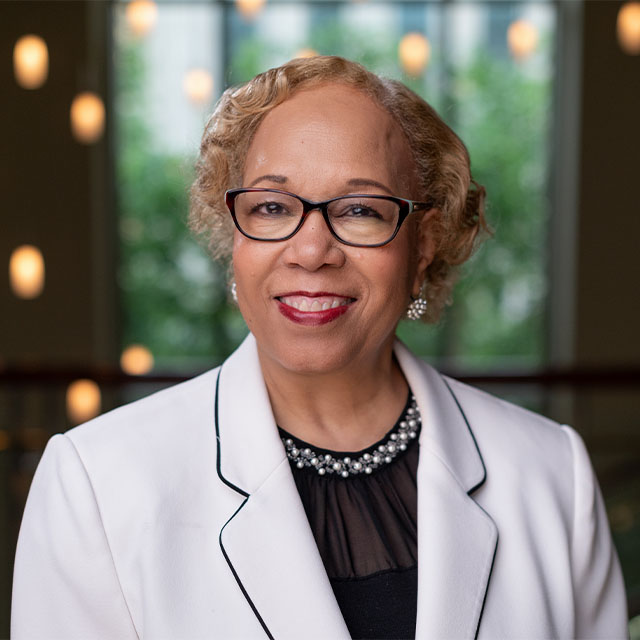
Senior Vice President of Education & Chief Community Impact Officer, Bushnell Center for the Performing Arts
Yolande N. Spears is senior vice president of education & chief community impact officer at The Bushnell Center for the Performing Arts, Connecticut’s premier performance venue for Broadway theatre, music, dance, children's theatre, and special events. As SVP of education, she co-created The Bushnell’s award-winning PARTNERS program lead by Mitchell Korn Arts. The program, which provides arts in education and is integrated into curriculum for students of all ages, is nationally recognized and the recipient of numerous awards, including a prestigious Dawson Award.
As an author, Spears wrote a short story, “Buttered Biscuits,” that was published in the bestselling motivational series Wake Up & Live the Life You Love. Her other book, The Gift: How Music & Family Saved a Young Girl, won the Purple Dragonfly Book Award’s 2013 national Grand Prize for excellence in children’s literature. In 2014, Spears received the Catalyst Award as a transformational leader, the 100 Women of Color Award in 2015, the Milestone Award from the National Guild for Community Arts Education in 2018, and the Remarkable Women in Business Award from the Hartford Business Journal. She was awarded the distinguished title of International Visiting Professor by the Central Academy of Drama, in Beijing, China.
Eboni Nelson
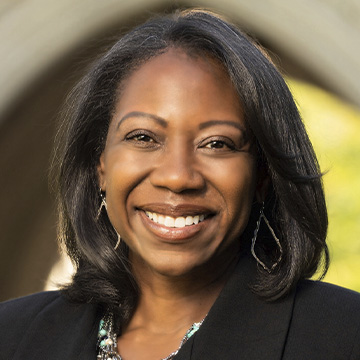
Dean and Professor of Law, University of Connecticut School of Law
Eboni S. Nelson became dean of the University of Connecticut School of Law on July 31, 2020. She came to UConn from the University of South Carolina School of Law, where she taught for 13 years. From 2018 onward, she served as the associate dean for academic affairs. Her scholarship, which has been published in numerous law review journals and other publications, focuses on education law and policy.
Dean Nelson has been recognized as one of the 100 Most Influential Blacks in Connecticut by the state conference of the NAACP and is the recipient of the 2022 George W. Crawford Black Bar Association Visionary Award. The Hartford Business Journal included her on its 2022 Power 50 List of influential leaders in the Greater Hartford area, and the Northeast Black Law Students Association named her an Inaugural Violet King Henry Woman of Excellence Honoree.
UHart Honors the Life and Legacy of Dr. King
The University of Hartford commemorates the prominent life and achievements of civil rights leader Dr. Martin Luther King Jr. who was born on January 15, 1929, and was assassinated, at the age of 39, on April 4, 1968. A champion of non-violent civil disobedience, racial equality, and social justice, King provided an unwavering commitment to justice that helped lead the American Civil Rights Movement and transformed the nation.
King was born into a long tenure of pastors. Both his grandfather and father were pastors at Baptist churches. King would later himself become a co-pastor until his death in 1968. Prior to becoming a co-pastor, King graduated high school at the age of 15 from Georgia’s first high school for black students, Booker T. Washington High School. In the summer of 1944, at 15 years old, King journeyed closer to home in Simsbury, Connecticut. During this time, he worked at a farm where he picked tobacco to earn money to attend Morehouse University.
King’s travels to Connecticut emphasized the plight of black people in America; while traveling he had to sit in “colored” train cars until he reached Washington, D.C. where he was finally able to switch seats. This experience would be his first lived experience without segregation. While in Simsbury, King wrote letters home about his experiences in the North stating, “On the way here we saw things I never anticipated to see. After we passed Washington, there was no discrimination at all. … We go to any place we want to and sit anywhere we want to.”
A memorial to King is located in Simsbury and the tobacco farm land where he worked is protected space. King would later visit Simsbury for a second time before finishing college. He received his Bachelor of Art degree from Morehouse College, a historically black, men’s liberal arts college in Atlanta, Georgia, in 1948. King would later receive his doctorate degree in systemic theology from Boston University. His time in Connecticut as well as his religious and educational upbringing influenced his journey to becoming an activist and influential figure in the American Civil Rights Movement.
King first became involved in the Civil Rights Movement through the Montgomery bus boycotts of 1955. These boycotts were a mass protest that arose from the arrest of Rosa Parks and concluded after over a year with the U.S. Supreme Court ruling it unconstitutional to have segregation on public buses. Prior to the bus boycotts, King was a member of the executive committee of the NAACP, preparing him for his involvement in the boycotts and many more movements. He would later lead many notable protests and marches including his famous August 28, 1963, March on Washington where he delivered his “I Have a Dream” speech. Through his work, King raised awareness around civil rights, social injustice, and economic inequality throughout the nation.
In 1964, King accepted the Nobel Peace Prize “for his non-violent struggle for civil rights for the Afro-American population,” presented by Gunnar Jahn, chairman of the Nobel Committee. In his acceptance speech, he noted the racial injustices occurring in the United States and accepted the award on behalf of the Civil Rights Movement. At this time, King became the youngest person to accept this honor. On December 11, 1964, King delivered his Nobel Lecture titled “The Quest for Peace and Justice.” A transcript of this lecture can be found on the Nobel Prize organization’s website.
King’s work brought him to the University of Hartford in 1959 when Hillyer College invited him to deliver one of the lectures in the University’s Alexander S. Keller Memorial Fund Lecture series at Bushnell Memorial Hall. King delivered one of his speeches, “The Future of Integration,” which spoke on the historical and societal barriers to racial integration. The Keller Lectures’ press releases, transcripts, and recordings including Q&A sessions are newly digitized and available for researchers to use in the University’s Harrison Libraries.
As heard on a recording of the 1959 speech, King tells the Hartford audience, “…What we need (is) a committed liberalism - one where individuals stand up on basic principles and give themselves to the right side of this issue realizing that right is right and wrong is wrong and never the twain shall meet. This is something we must do."
Many renowned civil rights events followed King’s speech in Hartford including non-violent lunch counter sit-ins, school desegregation cases, freedom riders who took bus trips to the south to protest segregated restrooms and lunch counters, the March on Washington, and the bombing of 16th Street Baptist Church in Birmingham. In July 1964, President Lyndon Johnson signed the Civil Rights Act of 1964 into law with King in attendance.
In honor and rememberence of the life and legacy of Dr. Martin Luther King, Jr., the University of Hartford hosts its annual observance program.
Dr. Martin Luther King Jr., (1929–1968)There comes a time when one must take a position that is neither safe, nor politic, nor popular, but he must take it because conscience tells him it is right.
Join us in February to Celebrate Black History Month
| Program | Date/Time | Location |
|---|---|---|
| Annual MLK Program | Wednesday, February 5, 2025 - 12:45 p.m. | Lincoln Theater |
| Some Blues, Some Jazz and Soul Food – Dream Big! | Friday, February 7, 2025 - 6 p.m. | Konover Great Room |
| Student Panel: “Living the Dream” |
Wednesday, February 12, 2025 - 12:45–2 p.m. | Shaw Center |
| The Office of Inclusive Excellence and Belonging hosts Experiencing Belonging: “Share Your Story” Panel discussion | Wednesday, February 19, 2025 - 12:45–2 p.m. | Shaw Center |
| BSU Paint Night – “A Canvas of my Ancestors” | Wednesday, February 19, 2025 - 5 p.m. | Konover Great Room |
| Black Student Union (BSU) Fashion Show: “On Demand” | Saturday, February 22, 2025 - 5–9:30 p.m. | Lincoln Theater *all proceeds benefit the BSU Book Fund* |
| Meet the Divine Nine – “A Legacy of the Ancestors” |
Thursday, February 27, 2025 - 6 p.m. | Konover Great Room |
Inclusive Excellence and Belonging at UHart
Save the Date for Diversity Week: March 18-23: UMatter@Hart
The University is committed to fostering a welcoming campus climate that is inclusive, and an environment where students, faculty, and staff feel safe and supported. You can learn more by exploring our webpage.